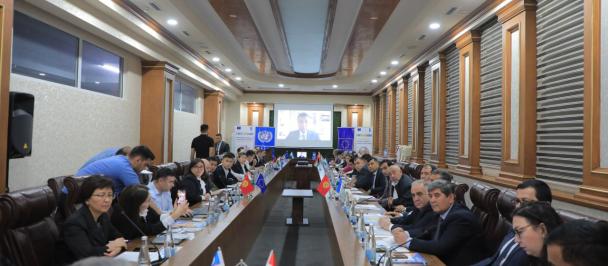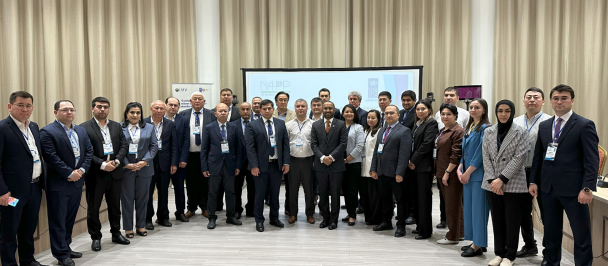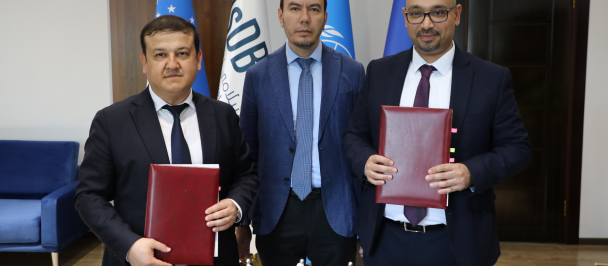Matilda Dimovska, UNDP Resident Representative
From 26 to 28 September 2019, Ms. Matilda Dimovska, UNDP Resident Representative in Uzbekistan, visited the Republic of Karakalpakstan to familiarize with the current state of the region, efforts of the Government to prevent the consequences of the environmental crisis, as well as the UNDP activities in Karakalpakstan
- Official meetings, results of interaction, new horizons for cooperation
The visit began with meetings in Jokargy Kenes of the Republic of Karakalpakstan., where Ms. Dimovska emphasized the importance of the Aral Sea region in UNDP activities in Uzbekistan. Within the framework of joint programmes and initiatives, 64 projects have been implemented since 2012 to improve social infrastructure, having provided more than 66,000 rural residents with access to drinking water, electricity, healthcare and education. More than 215 small business development initiatives have received support, including those aimed at promoting green technologies in rural areas. In addition, 3,710 community health volunteers throughout the region have been trained in hygiene and healthcare, resulting in improved medical literacy of 213,420 people. According to the Karakalpak branch of the Institute of Health and Medical Statistics at the Ministry of Health of the Republic of Karakalpakstan, the incidence of tuberculosis in the region over five years has decreased to 78 per 100,000 people from 103 per 100,000 people in 2012.
Within the framework of the country's first UNDP and Adaptation Fund joint project, in close cooperation with the local population, 10 pasture cooperatives have been established on a total area of 15,300 hectares, with 43,000 members being united by the common goal - restore the productivity of degraded pastures and create new ones. A set of measures is being implemented to ensure climate-resilient agriculture by piloting agro and water-saving technologies and applying adaptation practices at the landscape level in support of implementation of the Resolution of the President of the Republic of Uzbekistan "On the State Programme for development of the Aral Sea region for 2017-2021". At the same time, as noted at the meeting, the Aral Sea region is a priority for UNDP in the context of integration and achievement of the Sustainable Development Goals.
"UNDP in Uzbekistan is ready to further support the people affected by the Aral Sea disaster by addressing multiple human insecurities. UNDP looks forward to raise the ambition of joint engagement to support the implementation of the initiative of the President of the Republic of Uzbekistan to turn the Aral Sea region into the zone of environmental innovations and technologies, thus ensure the sustainable development of the region," Ms. Dimovska emphasized during the high-level meeting.
At the last year's meeting of the Heads of the founding States of the International Fund for Saving the Aral Sea, the President of Uzbekistan Shavkat Mirziyoyev proposed to declare the Aral Sea region a zone of environmental innovation and technology. This is expected to help countries work together to create the conditions for attracting foreign investment in the development and implementation of environmentally friendly technologies, implementing the principles of the "green" economy, environmentally friendly, energy- and water-saving technologies in an integrated manner, preventing desertification and environmental migration, developing ecotourism, and implementing other measures.
On the same day, a ceremony was held in Nukus to launch a new UNDP and UNESCO project "Addressing the urgent human insecurities in the Aral Sea region through promoting sustainable rural development". The project, aimed at mitigating the negative environmental, social and economic impacts on the region's most vulnerable communities, has received financial support from the UN Multi-Partner Human Security Trust Fund for the Aral Sea region.
"Let me assure you that UNDP gives high priority to supporting the Aral Sea region and will work to expand its engagement in the region," Ms. Dimovska said in her welcoming speech to the participants of the ceremony. "UNDP will work to bring global expertise to jointly explore innovative solutions for integrated achievement of SDGs in the region."
- Supporting the implementation of technologies to adapt farms and households to climate change
Since 2014, UNDP has been working closely with the Centre of Hydrometeorological Service of the Republic of Uzbekistan (Uzhydromet) within the framework of the joint project "Developing climate resilience of farming communities in the drought prone parts of Uzbekistan", funded by the UNFCCC Adaptation Fund. As an example of one of the approaches to climate change adaptation at the landscape level, pasture cooperatives have first been established in Karakalpakstan with the support of the project. Their task is to organize a sustainable feed base for developing pasture farming, efficiently manage pastures, restore and improve degraded lands. As part of the visit, Ms. Dimovska took part in a ceremony of transferring three tractors to local pasture communities established within the framework of the project.
As part of the visit programme, meetings were held in the Takhtakupir district. Here, the practice of developing intensive gardening on the area of the "Bazarbay Bagman" farm (the "Kara Oy" rural citizens’ assembly) is being implemented. The advantages of this practice include the possibility of obtaining a crop yet in the 2nd or 3rd year after planting dwarf trees, while strong-grown ones yield only in the 5th to 7th years. Tree management does not require much effort, and water is saved by drip irrigation technologies widely used here.
- Improving social infrastructure, promoting business ideas, improving the well-being of residents
Ms. Dimovska visited a site for improving the district's social infrastructure, where a water desalination station has been reconstructed to provide drinking water to the residents of the "Taza Oray" community (the "Daukara" rural citizens' assembly). The project was implemented by UN Joint Programme "Building the resilience of communities affected by the Aral Sea disaster through the Multi-Partner Human Security Trust Fund for the Aral Sea region" with the assistance of the Swiss Agency for Development and Cooperation.
The next point of the visit was the "Takhtakupir" mahalla citizen's assembly, where a 150-ton storage facility for fruits and vegetables has been created with the assistance of the Joint Programme. There are more than 260 farms in the Takhtakupir district. In 2018, the total production of fruits and vegetables was 3,314 tons. Given economic factors, as well as local climatic features, this initiative is important for local farmers and gardeners.
"We have a great opportunity to establish close ties with local farmers, households and end-consumers. In the past, due to the lack of appropriate equipment and technology, we were unable to store products for longer than a certain period. Fruits and vegetables quickly deteriorated, especially in the summer. Now this problem has been solved, and in the long term we plan to start exporting local products to the CIS countries," the initiator of the project Azizbek Djumanazarov said at the meeting with Ms. Dimovska.
On the same day, the UNDP Resident Representative in Uzbekistan familiarized herself with the activities of two business support facilities for income generation in the "Aydin Jol" mahalla citizen's assembly. The family enterprise "Borshi", directed by Dauran and Marziya, produces seeds in modern bright packaging. And the "Rano Sheber" diversified workshop specializes in the production of bedding, clothing and other camel wool products by using the most modern equipment.
The second day of the study visit began with a trip to the Muynak district. A branch of the Family Polyclinic No. 32 is located in the "Tikozek" rural citizens' assembly, with solar photovoltaic panels installed to provide uninterrupted power supply. In addition, Ms. Dimovska met with community health volunteers, who together with the Ministry of Health of the Republic of Karakalpakstan are working on raising public awareness on respiratory, cardiovascular and gastroenterological diseases and reproductive health.
During another meeting, dozens of children surrounded the UNDP delegation after a dismissal bell rang. In the center of Muynak city, the school No. 1 is located, with 530 students enrolled. The educational institution lacked training places. The UN Joint Programme has assisted in the reconstruction of an additional building for primary school students, which now easily accommodates 120 children per shift.
Manzura Erniyazova, the head of the "Karakalpak Sheberi Manzura" workshop, also gave no less hearty reception. There are 10 girls and women working here, who sew with their own hands the history of their native land in patterns on doll outfits and souvenirs, carefully lay out shells on canvases, and decorate national costumes and headgear for various celebrations. Recently, dry-cleaning services are also available here.
Another target along the route of Ms. Dimovska's visit was the "Ajiniyaz Jaylaulari" pasture cooperative (the "Khakim Ata" rural citizens' assembly), established in 2018 with the support of UNDP.
Today, the cooperative has about 582 hectares of pasture land and provides efficient livestock and agricultural management services for 595 households - members of the cooperative. As climate-resistant practices for pasture restoration and livestock development in drought conditions, the project has introduced the technology of harvesting green feed in a hydroponic plant with a capacity of 500 kg/day, which makes it possible to feed up to 50 cattle per day, which in turn removes the load on pasture land and restores 100 hectares of pastures per year.
At the end of the visit, Ms. Dimovska visited the Shumanay district, where she familiarized herself with the operation of the milk processing workshop, as well as the men's footwear manufacturing workshop, which were initiated within the framework of projects aimed at income generation for the local population.

 Locations
Locations


